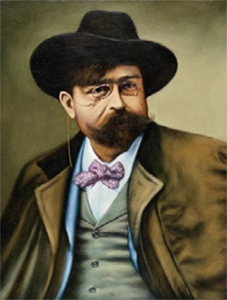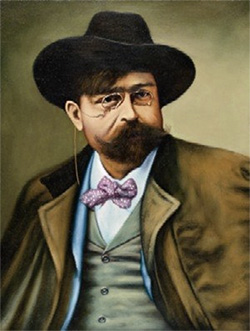Isaac Albéniz
Isaac Albéniz (1860-1909) made his debut as a pianist at the age of five, dressed by his parents as a French musketeer. When he got a little older, he repeatedly ran away from home to perform in various Spanish cities. At 15 he travelled to the New World, according to legend as a stowaway on a freight ship, carrying only his musketeer’s dress.

albeniz
He is then supposed to have led a vagabond life throughout the Americas, giving concerts in Brazil, Cuba and the USA. Back in Europe, he enrolled in the Leipzig Conservatory, but was disappointed with the dry formality of the German educational system. In 1878 he studied with Liszt in Weimar and Budapest. His artistic career did not really blossom until he had returned to Spain and met Felipe Pedrell, “the father of Spanish music”. Albeniz was inspired by Pedrell to write music rooted in the Spanish culture. From 1885 onwards, when he had settled in Madrid, he became a renowned piano teacher, and travelled widely as a virtuoso performer, his playing being compared to that of Anton Rubinstein and Liszt. He subsequently lived in London and later in Paris, where he became friends with Debussy, Fauré, Dukas and d´Indy.
Albéniz has been described as extrovert, kind, humorous, and generous, and certainly wrote music to match this joyful and exuberant personality. He composed an enormous oeuvre, mostly works for piano solo but also concertos, symphonic works and music dramas (The Magic Opal, Pepita Jimenez, Merlin). His efforts to create a Spanish national opera were met with constant opposition from the critics.
After 1900, Albéniz´s health deteriorated and his prodigious musical production diminished. Yet, these years produced his greatest masterpiece, his suite Iberia for piano – twelve pieces of such complexity and difficulty that they were first pronounced unplayable. This is probably the most important Spanish piano work of all times. Albeniz left several other important additions to the piano repertoire, such as the suites España, Cantos de España and Recuerdos de Viaje.
All pieces: |
||||
|---|---|---|---|---|
Iberia |
||||
| 1. Evocation | A-flat Minor | 1906 | 8 | |
| 2. El Puerto | D-flat Major | 1906 | 7 | |
| 3. El Corpus en Sevilla | F-sharp Minor | 1906 | 8+ | |
| 4. Rondeña | D Major | 1906 | 8 | |
| 5. Almería | N/A | 1906 | 8+ | |
| 6. Triana | N/A | 1906 | 8+ | |
| 7. El Albaicín | N/A | 1907 | 8+ | |
| 8. El Polo | F Minor | 1907 | 8+ | |
| 9. Lavapiés | F Minor | 1907 | 8+ | |
| 10. Málaga | N/A | 1908 | 8+ | |
| 11. Jerez | C Major | 1908 | 8+ | |
| 12. Eritaña | N/A | 1908 | 8+ | |
España Op. 165 |
||||
| 1. Preludio | N/A | 1890 | 8+ | |
| 2. Tango | N/A | 1890 | 7 | |
| 3. Malagueña | N/A | 1890 | 8+ | |
| 4. Serenata | N/A | 1890 | 8+ | |
| 5. Capricho Catalán | N/A | 1890 | 8+ | |
| 6. Zortzico | N/A | 1890 | 8+ | |
Cantos de España Op. 232 |
||||
| 1. Prelude / Asturias | G Minor | 1892 | 8 | |
| 2. Oriental | D Minor | 1892 | 7 | |
| 3. Bajo la palmera (Cuba) | E-flat Major | 1892 | 7 | |
| 4. Córdoba | N/A | 1892 | 7 | |
| 5. Seguidillas | F-sharp Major | 1892 | 8+ | |
The Seasons Op. 201 |
||||
| 1. The Spring | A Major | 1892 | 8 | |
| 2. The Summer | D Major | 1892 | 8+ | |
| 3. The Autumn | A Minor | 1892 | 6 | |
| 4. The Winter | D Minor | 1892 | 8+ | |
Suite Ancienne No 3 |
||||
| 1. Minuetto | G Minor | 1887 | 8+ | |
| 2. Gavotta | D Minor | 1887 | 8+ | |
Miscellaneous pieces |
||||
| Aragòn | F Major | – | 8+ | |
| Barcarolle Catalene | D-flat Major | – | 7 | |
| La Vega | A-flat Minor | – | 8+ | |
| Rapsodia Española | D Minor | – | 8+ | |
| Tango Espagnol | A Minor | – | 8 | |
| Zortzico | E Minor | – | 8+ | |
| Rapsodia Cubana Op. 66 | G Major | – | 8+ | |
| Sérénade Espagnole Op. 181 | D-flat Major | – | 8 | |
| Mallorca (Barcarola) Op. 202 | F-sharp Minor | – | 8 | |




Leave a Reply
Want to join the discussion?Feel free to contribute!